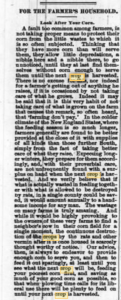Sarah Grubbs
AMST 276

Newspaper article on the importance of taking care of your crops. “Look After Your Corn.” The Chapel Hill Ledger, July 19, 1879.
Protecting Your Crops
19th century expansion is characterized by drastic growth in size and power within the United States during the 19th century. The country was able to build on previous ideas and begin to solidify the countries manufacturing processes, amongst other things. Specifically, the country developed new ways to increase the rate of manufacturing which lead to more mobility. Within these new methods to increase mobility and manufacturing, heavy progress of agriculture was highly distinguished. Ways to improve the cultivation of crops began to take high priority within the United States and lead to discoveries that influenced the way farmers tended to their crops and their land.
The item I analyzed is a newspaper article written by the Chapel Hill Ledger newspaper on July 19th, 1879. The newspaper article discusses the importance of farmers, specifically farmers in the Chapel Hill area, protecting their crops. It is specifically addressed to the farmers located in Orange County, advising them to take care of their crops and to take into account the little issues that may arise on the farm that could yield a lesser amount of corn. Farmers often times overestimate the amount of corn that they will attain after harvest, and by doing so do not consider the small mishaps that may occur during harvest. Things such as rats nibbling on the crops overtime can alter the amount of corn there is to serve. [1]
Looking into what this means for the Chapel Hill community requires an concrete understanding of the time period in which harvesting was most prominent. In all areas of the South in the 1800’s, plantations covered most of the land. Chapel Hill contained lands that farmers used for harvesting crops and feeding their families. As Chapel Hill began to grow in population over the following years, it became known as one of America’s smallest food towns. Today, Chapel Hill is notoriously known for carrying some of the most history- rich restaurants in America that have been around for decades. In conclusion, Chapel Hill, being one of the most distinguished places regarding food, was built on the foundation of plantations where crops were harvested every season.
[1] “Look After Your Corn.” The Chapel Hill Ledger, July 19, 1879. https://universityofnorthcarolinaatchapelhill-newspapers-com.libproxy.lib.unc.edu/image/58271869/?terms=crops